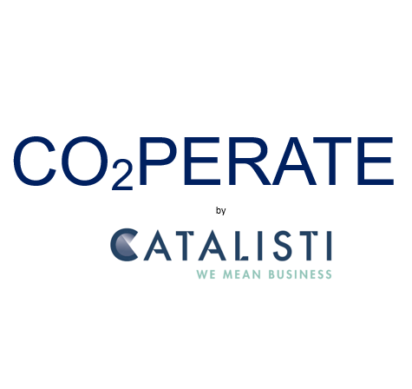All renewable CCU based on formic acid integrated in an industrial microgrid
CO2PERATE aims to develop catalytic technologies to convert CO2 into formic acid, using renewable electricity. Formic acid will subsequently be used as building block for the biosynthetic production of value-added chemicals, as a building block for the chemical industry, or as a potential carrier for energy storage. The processes developed within CO2PERATE hence provide grid stability and integrate renewable electricity generation with the chemical industry. To evaluate the potential of the different options, a decision support framework will be developed within CO2PERATE to select the best available technology for CO2 utilization within a given techno-economic context.
The CO2PERATE project (2.6 million euro) is funded by the Agentschap Innoveren en Ondernemen (VLAIO), and supported by Catalisti, the spearhead cluster for chemistry and plastics. This support represents a significant milestone for the development of state-of-the-art expertise in CO2 capture and utilization in Flanders and is expected to help address the impact of human activities on the environment. CO2PERATE is a collaboration between UGent, UAntwerp, KULeuven, VITO, and the Bio Base Europe Pilot Plant.
Turning waste into a resource
The discovery of efficient technologies that enable the use of CO2 as a starting material for chemical synthesis is one of the biggest scientific challenges of our time. It serves the dual purpose of reducing CO2 emissions and producing value-added chemicals using CO2 as a building block, thus helping mitigate the effects of climate change while creating new opportunities for the chemical industry.
With the launch of this project, the Flemish government provides a significant boost to establish a technology platform for catalytic CO2 reduction, focusing on all three potential routes for CO2 utilization:
- CO2-neutral fuels and chemicals
- CO2-based integration between renewable energy-production and chemical industry
- utilization of CO2 as a cost-effective C1 building block
To evaluate the potential of the different options, a decision support framework will be developed within CO2PERATE to select the best available technology for CO2 utilization within a given techno-economic context. The potentially new business models originating from CO2 utilization within CO2PERATE are expected to contribute significantly to economic and sustainable growth in Flanders’ circular economy.
ACTIVITIES of the Bio Base Europe Pilot Plant
- Bio Base Europe Pilot Plant will perform a screening (literature, patents…) and select microbial strains capable of converting CO2 & H2 or formic acid to added value products such as single cell proteins (SCP) and bioplastics (PHB).
- The selected microbial strains will be further evaluated by Bio Base Europe Pilot Plant with relation to biomass production and PHB (Polyhydroxybutyrate, bioplastic) storage.
- Bio Base Europe Pilot Plant will study at bench and pilot scale how process parameters can be influenced in order to obtain maximum biomass and PHB yield.
PARTNERS
- Ghent University, BE
- University of Antwerp, BE
- KULeuven, BE
- VITO, BE
- Bio Base Europe Pilot Plant, BE
SUPPORTED by:



 webdesign
webdesign